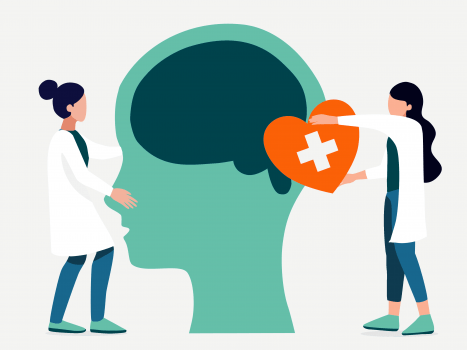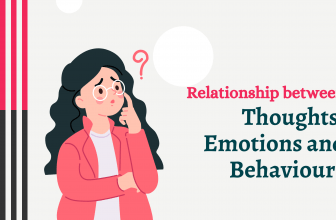Life can sometimes be a chaotic process. In order to look for a process in that chaos, it is extremely important for us to nurture our emotional, psychological and social well-being. Failing to pay attention to these aspects may affect the way we think, feel and act. To handle stress, to be able to relate to others and maintain healthy relationships, to be able to make better and healthy choices we need to be mentally healthy.
Like any physiological ailment which does not erupt overnight psychological issues also have their own history. Mental health is an important aspect at every stage of our life, from childhood, adolescents, adulthood, and old age.
When an individual faces a mental block or a mental hindrance in performing any task or activity it is advisable for him or her to seek help from a certified professional. Deciding to seek help for a mental health concern is no doubt a big step. However, this is also only the first step. There are different types of mental health professionals that specialize in different aspects of mental health or mental well-being. Determining which of the following types of mental health practitioners to consult might be difficult so here we have a brief overview of each professional how they can help and their area of expertise.
Psychiatrist
Psychiatry is the branch of medical science that evaluates, diagnoses, treats and administers various mental disorders that significantly affect emotion, cognition, and behaviour. Psychiatrists are doctors who specialize in psychiatry and have obtained an MD in psychiatry after completing an MBBS degree.
They are experts in the diagnosis and treatment of mental health problems. Psychiatrists study the functions of the brain including the complex link between the body and the brain during their specialized training. They have the training to differentiate between physical and psychological causes of mental and physical distress. They are also the only type of mental health professional who is licensed to prescribe and monitor medication to people dealing with mental health issues.
Psychologist
Psychology is a scientific study of the human mind and behaviour. All aspects of thoughts, emotions, and emotions that motivate our behaviour are scientifically evaluated through a variety of assessments and tests. Psychological knowledge is applied to understand and solve problems in different areas of human activity and is also used to assess and treat mental health problems.
Psychologists have a degree in psychology and are experts in human behaviour. Use scientific methods to investigate factors that influence how people think, recognize, feel, and behave.
They use evidence-based strategies and interventions to help people overcome challenges and address life issues such as:
- Relationship problems
- Parenting issues
- Challenges in adolescence
- Lifestyle effects on health
- Chronic illness
Psychologists use their clinical skills to work with people who have mental health issues like anxiety, depression, eating disorders, panic disorder, and substance abuse. There are different types of psychologists who perform different functions
- Clinical psychologists- They work in private clinics or hospitals. Reducing psychological distress, enhancing and promoting psychological wellbeing among people with mental health issues or mental illnesses such as anxiety, depression, addictions, or substance abuse.
- Counselling psychologists- They work in private clinics and hospitals and address the underlying problems that are causing imbalances in people who have not been diagnosed with mental illness like Loss of loved ones, problems with past and present relationships, problems with behaviour. They also help people change their attitudes and make their lives more meaningful.
- School psychologists- They work in educational institutions and government agencies. They assist children and adolescents to learn, develop and help them with any problem they face along with that they also work on creating educational policies.
- Neuropsychologists- They work with the relationship between the brain and its neuropsychological functions such as vision, memory, and smell. They deal with cases such as rehabilitation of people from brain injuries and neurological or brain degenerative diseases such as Stroke, Dementia, Tumors
- Occupational psychologist/therapist- They work in different workplaces and hire the best people for the job to develop strategies while motivating employees to help companies maximize their employees’ abilities and improve their job satisfaction. They help employees learn new skills and help people with mental well-being and in turn help them build and maintain their careers. They are also known as ‘Industrial Psychologists’.
- Forensic psychologist- This is again a subfield of psychology. They work in research and assistance in crime and justice and deal with the psychological aspects of legal processes and apply theory to both civil and criminal legal investigations. Psychological tests are used at many points in the investigation, prosecution, and punishment of a crime.
Counsellor
Counselling is a form of applied psychology that focuses on helping people solve emotional, behavioural, or social problems that arise from different living conditions. These can include problems at work, school, or college, and conflicts within the family.
Counselling uses a variety of structured processes to help people make rational decisions through a directive or non-directive guidance. Consulting services are completely confidential.
Counsellors can have very varied lengths of training, from a yearlong intensive training to a few months by correspondence. A counsellor is trained in the art of listening and has skills to help a person analyze their problems and find a solution.
Counsellors focus on the following:
- Resolving normal or moderate issues arising due to life events and other stressors rather than serious mental health issues
- Understanding the thought process, beliefs, and emotions, which in turn lead to action
- Giving importance to current events rather than past events
- Developing creativity, self-expression, assertiveness for one’s own needs
- Improving conscious, rational thinking, and emphasizing on a positive response to a life situation.
Psychiatric social worker
Psychiatric social workers are mental health professionals who help patients find solutions to life and social issues associated with mental illness. A patient’s relationships, career, and quality of life are significantly affected due to the illness; and this can be a very difficult situation to navigate. Social workers help patients cope with various aspects of their lives.
Psychiatric social workers carry out the following tasks in their job:
- Assess the patient’s emotional, social, economic, and mental health needs
- Educate the patient and family members about the illness and help them understand the patient’s treatment plan
- Evaluate the patient’s socioeconomic status and look for community resources that would be useful for them
- Facilitate individual, group, and family therapy sessions
- Help improve communication between the patient, family members, and healthcare team
- Create a plan to integrate patients back into the community
Psychiatric nurse
Psychiatric nurses are mental health professionals who are qualified to assess, diagnose, and treat individuals with mental illness. They work with individuals, families, groups, and communities to assess their mental health needs. It also helps families understand the challenges of mental illness and provide the appropriate care needed by their loved ones.
Each one of the above brings to the table their own expertise in dealing with people’s challenges and thereafter helping them tread towards their desired outcome or goals. When an individual is facing a certain challenge in their life they may be overwhelmed and not sure as to whom to approach for the problem that they are dealing with. In such situations, it is always best advised to begin by talking to a counselling psychologist who will be able to make their initial assessments and if counselling isn’t adequately addressing the person’s needs due to the severity of the underlying condition, the counsellor refers the person to a more qualified mental health expert for diagnosis, treatment, therapy, or medication, as necessary.






